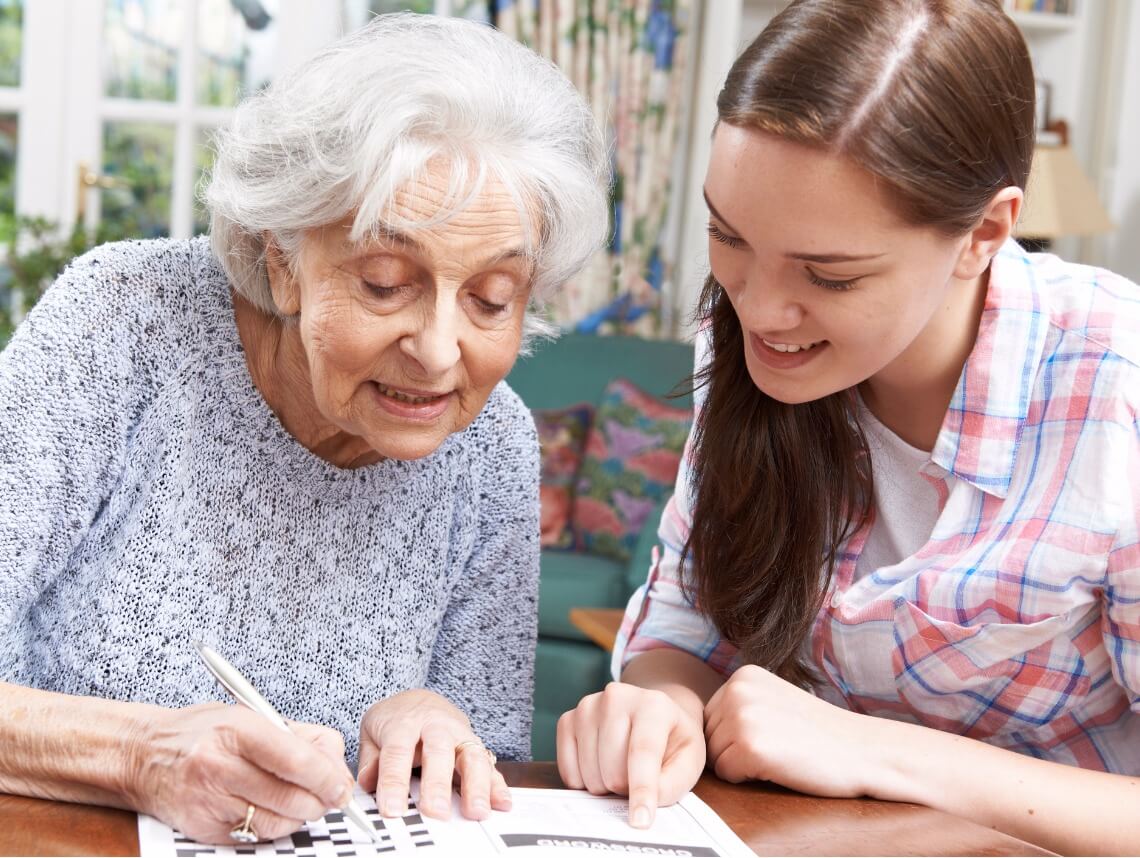
Just as physical exercise strengthens and trains our bodies, cognitive training and exercise stimulate the brain, helping it grow and develop new connections as we age. The more we challenge the mind (through various forms of mental exercise), the better it is at processing information.
As family caregivers, we want to be sure our loved ones remain healthy in every aspect – including their mental health.
7 Mind Stimulating Activities & Cognitive Games for Seniors
There are many different reasons that your elderly loved one might have cognitive issues, but keeping their brain active and engaged can help to make sure that you slow down that deterioration. Some of these activities might help and allow you and your loved one to have fun together.
The following mind stimulating activities provide ways to keep seniors sharp, helping to improve memory, problem-solving, creativity, and other cognitive functions.
1. Word Games
Word games serve as effective and fun ways to engage the mind. For seniors, puzzles help to improve memory, word recall, and other functions in the brain.
If your loved one enjoyed wordplay books in the past, such as word searches, Sudoku, and crossword puzzles, they may still enjoy them. They may not be able to still do the more advanced wordplay activities they enjoyed in the past, but if you find easier ones that can help quite a bit.
Look for books that have larger print and that are geared toward a younger vocabulary if you can.
Caregiver Tip: Encourage your loved one or patient to complete crossword puzzles found in the daily newspaper, or pick one up from the store. This type of cognitive activity provides entertainment and also keeps the mind active and sharp!
2. Games and Puzzles
Games and puzzles are also good for your loved ones, but only if they are able to keep up with them.
Choosing games or puzzles that are too advanced or too complicated may frustrate your loved one, causing them to give up. This is another occasion where finding puzzles and games intended for children may help your loved one to engage more fully.
Caregiver Tip: Something you might want to consider as your loved one’s family caregiver is tossing out the rules for your elderly loved one. It doesn’t matter if the game, puzzle, or other activity is done right necessarily, it’s more about engaging your loved one. If they’re able to be a little bit creative and stay engaged, then it might be worth it to stop worrying about whether the activity is being done properly or not. You might just find that you and your loved one have a lot more fun that way, too.
3. Card Games
Simple card games such as Poker, Solitaire, Go Fish, and Memory Match can help to improve cognitive function in seniors. Card games stimulate parts of the brain responsible for logical problem-solving and memory retention, along with other functions.
Caregiver Tip: Play card games with your loved one or patient after dinner to keep their mind sharp.
4. Chess & Strategy Games
Strategy games such as checkers and chess stimulate multiple parts of the brain and are widely used for educational purposes.
One study believes chess provides the following benefits:
- Likely to raise an individual’s IQ
- Helps to prevent Alzheimer’s and other forms of dementia
- Exercises both sides of the brain
- Increases creativity
- Improves memory, concentration, problem-solving, reading, and decision-making skills
5. Reading
Even if your elderly loved one has cognitive issues, books and magazines can still engage them and help keep their brain active.
Enjoying a good novel, reading an article on the web, or catching up with the daily news not only keeps seniors informed and entertained, but it helps to improve a variety of cognitive functions.
Reading sparks imagination and forces the brain to create images to match the words written on paper, making it one of the most entertaining and effective ways to exercise the brain.
Depending on your loved one’s current situation, they may find themselves enjoying books and magazines that may seem below their level. Some elderly loved ones enjoy children’s books because they’re easier to read and understand.
Caregiver Tip: Recommend a good novel for your loved one or patient to curl up with before bed.
6. Activities Involving the Use of Hands
Activities focusing on hand-eye coordination and creativity such as knitting, sewing, playing an instrument and even video games help seniors exercise their brains.
Caregiver Tip: Consider using a video game console for your patient or senior family member.
7. Physical Exercise & Healthy Lifestyle
Maintaining a healthy lifestyle is vital for improving your memory. Just as our muscles need exercise to grow, so do our brains.
Aside from eating healthy, getting a sufficient amount of sleep, and maintaining stress levels, it’s important to remain physically active.
For seniors with limited mobility, there are still many ways to stay active and keep the heart rate up, whether it’s walking, light gardening, housekeeping, stretching, or even meditation.
Exercise releases endorphins in the brain and has also been shown to improve one’s mood, vitality, alertness, and overall feelings of well-being.
Caregiver Tip: Talk to your loved one’s doctor about other activities that your loved one might enjoy that also fit in with their ability levels.
Related articles:
The Benefits of Group Exercise Classes for Seniors
Best Exercises for Seniors
Contact Care Options for Kids for Home Health Care Services
Keeping loved ones active and healthy (both physically and mentally) is imperative, but for busy family caregivers, it’s not always easy.
If you or an aging loved one are considering hiring home health care services, contact the caring staff at Care Options for Kids today. (888) 592-5855.
